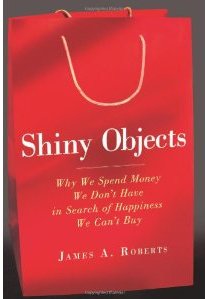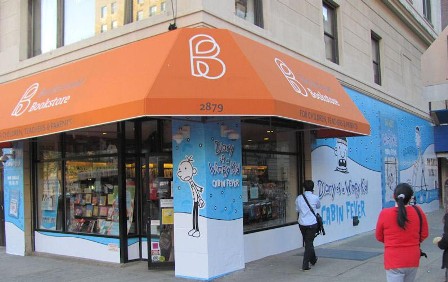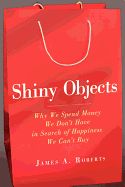 The Beatles may have sold us on the notion that money can't buy us love, but what about happiness? In Shiny Objects, veteran marketer and professor of consumer behavior James A. Roberts pulls back the curtain on advertising, the American Dream and contemporary consumerism in an attempt to encourage reflection on spending habits and a return to non-material pursuits.
The Beatles may have sold us on the notion that money can't buy us love, but what about happiness? In Shiny Objects, veteran marketer and professor of consumer behavior James A. Roberts pulls back the curtain on advertising, the American Dream and contemporary consumerism in an attempt to encourage reflection on spending habits and a return to non-material pursuits.
Two parts sociology and one part self-help, Shiny Objects contains a thorough review of the literature related to spending and happiness. Roberts calls attention to the deep contradiction between Americans' stated belief that material possessions cannot make us happy and the undeniable fact that we continue to buy as if they will. Additionally, numerous studies indicate that happiness is largely biologically determined--that we inherit it rather than acquire it--so though we may feel a boost in happiness immediately after a purchase, it is short-lived. We quickly adapt to the "new normal" and begin looking for the next acquisition and the next temporary bump. Roberts calls this the "treadmill of consumption," and he cites evidence that pursuit of material possessions (and the long hours of work and stress required to pay for them) is inversely related to well-being, self-acceptance, personal relationships, community involvement and other indicators of social, psychological and physical health. In fact, the primary difference between happy people and unhappy people is not income, homeownership or the number of gadgets owned, but social relationships. Accordingly, Roberts encourages readers to check their consumer behaviors and rededicate themselves to pursuing relationships and avocations that can lead to genuine happiness, and he provides quizzes, checklists and basic cognitive-behavior tools to help them do so.
But Shiny Objects is about more than research. Roberts reveals marketing techniques and ploys in hopes that informed consumers will be less likely to fall prey to them, and he explores the social models that prop up our materialistic values, from the American Dream to the increasingly popular prosperity gospel, to the product placement that is rampant in entertainment (there are 205 product placements in the average episode of The Biggest Loser!). Giving readers a wealth of information to parse, Roberts--who cannot seem to decide if he is a theorist, a therapist or both--offers an intellectual approach to an emotionally charged subject and suggests concrete changes readers can effect in their lives and environments to escape from materialism and build lives with real meaning. --Rebecca Joines Schinsky
Shelf Talker: An intellectual approach to an emotionally charged subject--consumerism--with suggestions on how to escape materialism and build a life with real meaning.
 "I would say that they should go after recommendations. That's what we're doing--at the Strand, you walk in the store and we have such educated book lovers, almost everybody's majored in literature at the Strand. I want Barnes & Noble to stay afloat, because I want more people to read books, whether they're buying them from the Strand or from anywhere. That would make me happy."
"I would say that they should go after recommendations. That's what we're doing--at the Strand, you walk in the store and we have such educated book lovers, almost everybody's majored in literature at the Strand. I want Barnes & Noble to stay afloat, because I want more people to read books, whether they're buying them from the Strand or from anywhere. That would make me happy."




SHELFAWARENESS.1222.S1.BESTADSWEBINAR.gif)



 The tablet wars are now officially underway: the debut of Amazon's Kindle Fire is imminent and yesterday Barnes & Noble introduced its highly anticipated, $249
The tablet wars are now officially underway: the debut of Amazon's Kindle Fire is imminent and yesterday Barnes & Noble introduced its highly anticipated, $249 SHELFAWARENESS.1222.T1.BESTADSWEBINAR.gif)
 Copperfield's Books has closed its Santa Rosa, Calif., store and will re-open in its new location this Friday, November 11. Copperfield's has eight stores in Sonoma and Napa counties.
Copperfield's Books has closed its Santa Rosa, Calif., store and will re-open in its new location this Friday, November 11. Copperfield's has eight stores in Sonoma and Napa counties. Gibson's Bookstore, Concord, N.H., where a Books-A-Million opened last Friday, has
Gibson's Bookstore, Concord, N.H., where a Books-A-Million opened last Friday, has  Gayle Shanks, co-owner of Changing Hands, Tempe, Ariz., wrote
Gayle Shanks, co-owner of Changing Hands, Tempe, Ariz., wrote 
 Congratulations to the Food for Thought Books Collective, Amherst, Mass., which is celebrating its
Congratulations to the Food for Thought Books Collective, Amherst, Mass., which is celebrating its  The Beatles may have sold us on the notion that money can't buy us love, but what about happiness? In Shiny Objects, veteran marketer and professor of consumer behavior James A. Roberts pulls back the curtain on advertising, the American Dream and contemporary consumerism in an attempt to encourage reflection on spending habits and a return to non-material pursuits.
The Beatles may have sold us on the notion that money can't buy us love, but what about happiness? In Shiny Objects, veteran marketer and professor of consumer behavior James A. Roberts pulls back the curtain on advertising, the American Dream and contemporary consumerism in an attempt to encourage reflection on spending habits and a return to non-material pursuits.